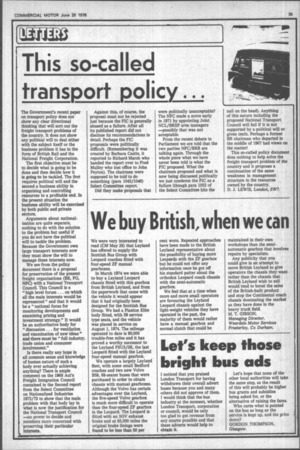This so-called transport policy . . .
Page 37

If you've noticed an error in this article please click here to report it so we can fix it.
The Government's recent paper on transport policy does not show any clear directional thinking that will sort out the freight transport problems of the country. It does not show any political will to deal either with the subject itself or the business problem it has in the form of British Rail and the National Freight Corporation.
The first objective must be to decide what is going to be done and then decide how it is going to be tackled. The first requires political will and the second a business ability in organising and controlling resources to a profitable end. In the present situation the business ability will be exercised by both public and private sectors.
Arguments about nationalisation are quite separate, nothing to do with the solution to the problem but useful if you do not have the political will to tackle the problem. Because the Government own large transport interests now they must show the will to manage these interests now.
We see from the policy document there is a proposal for preservation of the present freight organisations (BR, PO, NFC) with a National Transport Council. This Council is a "high level forum ... on which all the main interests would be represented" and that it would be a "national focus for monitoring developments and examining pricing and investment strategy." It would be an authoritative body for "discussion . . . for ventilation and examination of new ideas" and there must be "full industry, trade union and consumer Involvement."
Is there really any hope in all common sense and knowledge of human nature of such a body ever actually achieving anything? There is ample comment on the 1968 Act's Freight Integration Council contained in the Second report from the Select Committee on Nationalised Industries 1972/73 to show that the main problem with that body lay in what is now the justification for the National Transport Council —no power to decide and members more concerned with preserving their particular Interests. Against this, of course, the proposal must not be rejected just because the FIC is generally abused as a failure. After all its published report did not disclose its recommendations in detail. Perhaps the FIC proposals were politically difficult. (Remembering it was created by Barbara Castle, it reported to Richard Marsh who handed the report over to Fred Mulley who lost office to John Peyton). The chairmen were supposed to be told to do something (para 1045/1046) Select Committee report.
Did they make proposals that were politically unacceptable? The NFC made a move early in 1971 by appointing Joint NCL/BRSP area managers —possibly that was not acceptable.
From the recent debate in Parliament we are told that the two parties NFC/BRB are talking again. Through the whole piece what we have never been told is what the FIC proposed. What the chairmen proposed and what is now being discussed politically we just condemn the FIC as a failure (though para 1052 of the Select Committee hits the nail on the head). Anything of this nature including the proposed National Transport Council will fail if it is not supported by a political will or given teeth. Perhaps a former BR chairman who departed in the middle of 1967 had views on the matter!
This so-called policy document does nothing to help solve the freight transport problem of the country and it proposes a continuation of the same weakness in management structure in the resources owned by the country.
D. J. LEWIS, London, SW7.




















































































